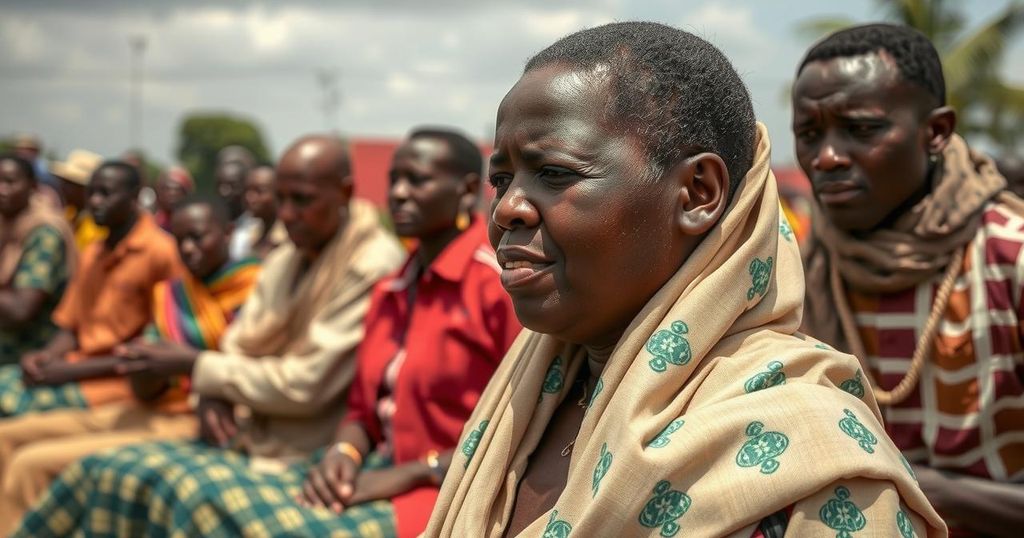The United States has declared that the Rapid Support Forces committed genocide in Darfur, imposing sanctions on RSF leader Mohammed Hamdan Dagalo and associated firms. This action comes amidst widespread violence and atrocities in Sudan, as documented by Human Rights Watch. The U.S. is encouraged to enhance sanctions and provide evidence to international bodies for justice purposes.
On January 7, 2025, the United States government announced its determination that the Rapid Support Forces (RSF) committed genocide in Darfur amid the ongoing conflict in Sudan. Furthermore, the U.S. enforced sanctions against RSF commander Mohammed Hamdan Dagalo and seven associated companies for their involvement in severe human rights abuses. The RSF has engaged in violent confrontations with the Sudanese Armed Forces (SAF) since April 2023, committing numerous war crimes, including ethnic killings, sexual violence, and mass displacement, according to reports from Human Rights Watch. This announcement is viewed as a significant advancement towards accountability for the atrocities being committed in the region.
The U.S. government’s declarations are a critical step toward ensuring justice for the Sudanese populace. It is suggested that the United States should provide evidence to the UN Fact-Finding Mission and the International Criminal Court to advance the pursuit of justice in Sudan. Additionally, the U.S. has a responsibility to enhance sanctions against all parties obstructing humanitarian aid and violating the arms embargo in Darfur. Stronger measures should be taken against allies, notably the United Arab Emirates, to cease any transfer of weaponry to Sudan.
The situation in Sudan has been dire, as the RSF transitioned from being a militia to a formidable military force engaged in widespread conflicts, severely impacting civilian populations in Darfur. Human Rights Watch has documented harrowing acts including systematic ethnic killings, severe instances of sexual violence, and large-scale displacements, contributing to humanitarian crises in the region. These findings underline the severity and urgency of the U.S. government’s recent actions.
Nicole Widdersheim, Deputy Washington Director at Human Rights Watch, emphasized the need for the U.S. to shift its policy towards Sudan to prioritize accountability and the protection of civilians: “The State Department’s announcement should be the first step toward redefining US policy in Sudan with accountability and civilian protection at the center. We hope to see more pressure from the United States on the parties to the conflict and US allies to respond to past and ongoing atrocities and human suffering.”
In summary, the determination of genocide by the United States marks a pivotal moment in addressing the human rights violations occurring in Sudan. While the sanctions imposed on RSF commanders and affiliates constitute progress, they also highlight a broader obligation for the United States to collaborate with international bodies to ensure accountability and support for the affected populations. Continuing to apply pressure on all involved parties, including international allies, is essential to fostering peace and security in the region.
The conflict in Sudan, particularly in Darfur, has been marked by extreme violence and human rights violations since the eruption of hostilities in 2023. The Rapid Support Forces (RSF), originally formed from militias, have been implicated in severe atrocities including ethnic cleansing, war crimes, and widespread displacement of civilians. The U.S. government’s formal recognition of genocide aims to shed light on these abuses and promote efforts for accountability and humanitarian assistance in the region. Human Rights Watch and other organizations have played vital roles in documenting these violations and advocating for actions against perpetrators.
The formal recognition of genocide in Sudan signifies a commitment by the United States to confront serious humanitarian crises and support justice for those affected. While positive steps such as sanctions have been implemented against key perpetrators, the necessity for broader international collaboration remains critical. Ensuring civilian protection and holding violators accountable will require ongoing diligence and pressure from the international community, particularly the United States.
Original Source: www.socialnews.xyz






